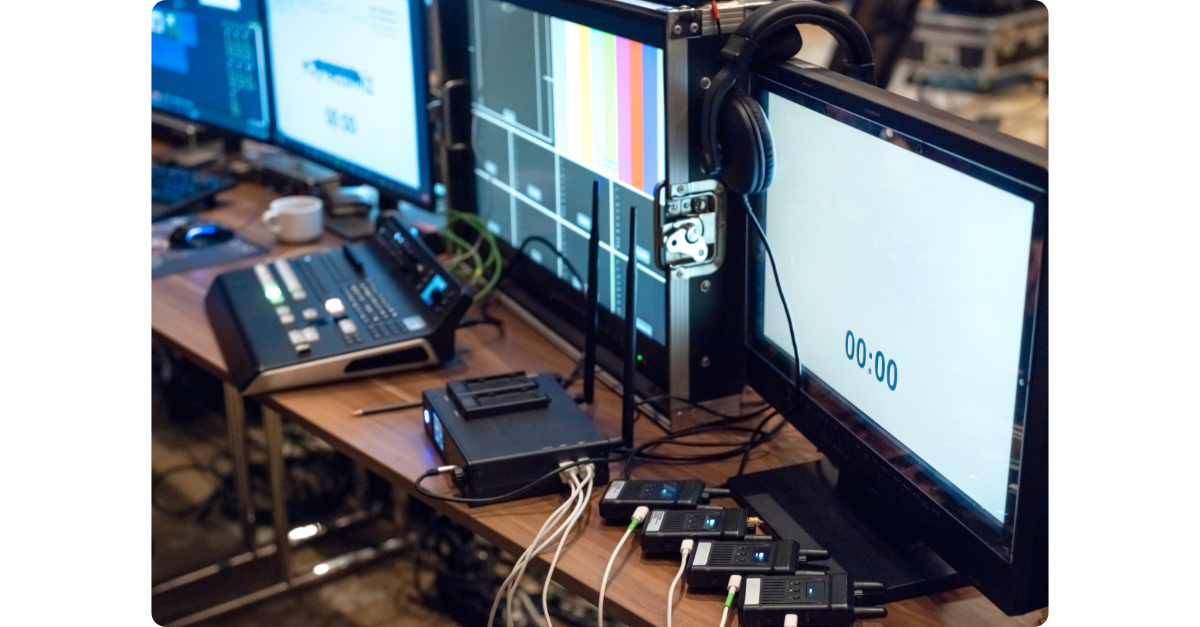Revolutionizing Events in 2025 with Cutting-Edge Event Technology
ExpoTools Blog
December 16, 2025
Welcome to 2025, a time when event tech is no longer just a luxury but an essential part of the event planning world. Imagine crafting an event where everything flows seamlessly—from the moment attendees register to the final applause. Thanks to tools like event manager apps, event analytics, and audience engagement tools, this isn't just possible; it's becoming the standard.
This year, the focus is on creating smarter, more engaging events while boosting efficiency and ROI. Whether you're organizing a hybrid conference, a virtual expo, or an in-person gala, the right event technology services can take your event to the next level.
What is Event Tech?
At its core, event tech is the technology that makes modern events run smoother, more efficiently, and more engaging. It's a suite of tools, apps, and platforms that take care of everything from managing registrations and tracking attendance to creating interactive, memorable experiences for your audience. In a nutshell, event technology is how event planners work smarter, not harder.
Gone are the days of juggling spreadsheets, emails, and paper programs. With event tech, you can automate repetitive tasks like sending out reminders, checking people in, or managing ticket sales. At the same time, you're empowering attendees with tools that make their experience better, whether that's through personalized content, live polls, or a sleek mobile app that lets them navigate your event like a pro.
Here's what makes event tech so exciting:
- Automation for Efficiency: Say goodbye to manual processes. Tools like event manager apps can handle check-ins, send schedule updates, and even automate post-event follow-ups. This frees you up to focus on what really matters: delivering a standout event.
- Engagement Tools: Today's attendees expect more than just sitting in a session or walking a trade show floor. They want to participate, connect, and interact. Features like gamification, live Q&A sessions, and audience engagement tools turn attendees into active participants.
- Real-Time Data and Analytics: The ability to track what's working—and what's not—is a game-changer. Event analytics can show you who's attending which sessions, how engaged they are, and even help you fine-tune your approach on the fly.
Think about it like this: if you're planning an event, you're probably dealing with dozens of moving parts. You've got speakers, attendees, schedules, sponsors, and countless other details to manage. Event technology services bring all those elements together under one roof, making everything easier to handle.
But event tech isn't just for large-scale conferences or hybrid events. Smaller gatherings can benefit just as much. For example, imagine hosting a networking event where attendees use a custom-branded app to share contact details, find others with similar interests, and even participate in real-time polls. It's these little touches that make an event memorable and impactful.

In 2025, event technology is evolving even further, thanks to innovations like AI and machine learning. These advancements take personalization to a new level. Picture this: an attendee logs into your event app and gets a custom itinerary based on their interests. Or, you use predictive analytics to figure out which sessions will draw the biggest crowds—and make sure the room size is just right. These are just a few examples of how event tech can help you stay one step ahead.
At the end of the day, event tech is all about making life easier for organizers and creating unforgettable experiences for attendees. Whether you're a seasoned planner or just starting out, embracing the right tools can transform your events and help you deliver results that wow your audience.
Types of Event Technology Solutions
When it comes to event tech, one of its biggest strengths is its versatility. There's a solution for just about every aspect of event planning and execution, whether you're organizing a small in-person gathering, a fully virtual conference, or a hybrid event that combines the best of both worlds. Let's dive into the most popular types of event technology solutions and what they bring to the table.
Event Management Software
Event management software is the backbone of any well-organized event. Think of it as your command center, where you can oversee every detail in one place. These platforms handle planning, scheduling, budgeting, and logistics, making it easy to stay on top of everything. With features like task management, vendor coordination, and attendee tracking, they ensure nothing falls through the cracks. Popular tools in this category also integrate with other apps, allowing for seamless collaboration across teams.
Key Benefits:
- Centralized planning and tracking.
- Simplified communication with vendors and team members.
- Integration with other tools like CRM and marketing software.
Virtual Event Software
Virtual events have become a necessity in recent years, but in 2025, they've evolved into something far more dynamic and engaging. Virtual event platforms let organizers host webinars, conferences, and expos entirely online, complete with interactive features like live chats, breakout rooms, and virtual booths. They're ideal for reaching a global audience and cutting down on logistical challenges like travel and venue costs.
Key Benefits:
- Engage audiences remotely with interactive sessions.
- Expand reach by allowing attendees to join from anywhere.
- Track attendee participation with built-in analytics.

Hybrid Event Tools
Hybrid events combine the best of in-person and virtual experiences, and hybrid event tools make it possible to bridge the gap seamlessly. These platforms are designed to provide a unified experience for both physical and remote attendees. For example, hybrid tools might include live streaming capabilities, interactive features like Q&A and polls for both audiences and analytics that track engagement across the board.
Key Benefits:
- Offer flexibility to attendees, catering to different preferences.
- Increase audience reach while maintaining a personal touch for in-person attendees.
- Synchronize content delivery to ensure consistency.
Live Event Technology
Live events thrive on energy and interaction, and live event technology takes that to the next level. This category includes everything from real-time audience engagement tools to advanced analytics dashboards that monitor event performance as it happens. Tools like live polling apps, interactive displays, and augmented reality experiences create moments that captivate your audience while providing organizers with actionable insights.
Key Benefits:
- Drive engagement with interactive features.
- Use real-time data to adapt on the fly and improve outcomes.
- Create memorable, immersive experiences with technologies like AR/VR.
Event Registration Software
First impressions matter, and your registration process sets the tone for your event. Event registration software simplifies this step for both attendees and organizers. These platforms manage ticketing, collect attendee information, and often integrate with payment systems. Many also offer customizable registration pages to align with your event branding.
Key Benefits:
- Streamlined ticketing and payment processing.
- Easy attendee data collection for follow-ups.
- Professional-looking registration forms that match your brand.

Mobile Event Apps
Mobile event apps are like having a pocket-sized event guide for your attendees. These apps provide schedules, maps, networking features, and personalized content, all at their fingertips. For organizers, mobile apps open up opportunities to communicate directly with attendees through push notifications and surveys.
Key Benefits:
- Enhanced attendee convenience and engagement.
- Real-time updates for changes in schedule or announcements.
- Networking opportunities through attendee matchmaking or chat features.
Event Analytics Tools
Data is king, and event analytics tools help you make sense of it all. These platforms gather insights on attendee behavior, engagement levels, and session performance. They allow organizers to make data-driven decisions during the event and use those insights to refine future events.
Key Benefits:
- Real-time monitoring to identify what's working.
- Post-event reports to measure ROI and attendee satisfaction.
- Data to personalize future event experiences.
Interactive Event Technology
Interactive technology is all about making attendees active participants instead of passive observers. Gamification features like leaderboards and challenges can motivate engagement, while tools like live Q&A and audience polling make sessions more interactive. Augmented reality (AR) and virtual reality (VR) also fall into this category, offering innovative ways to capture attention and create unforgettable moments.
Key Benefits:
- Turn attendees into participants with gamification and interactivity.
- Deliver cutting-edge experiences using AR and VR.
- Increase engagement and satisfaction with creative, immersive tools.
Cloud-Based Event Software
Cloud-based tools are essential for modern event planning, offering accessibility and flexibility. Whether you're managing a team across multiple locations or need a scalable solution, cloud-based platforms let you work from anywhere and adapt to events of any size.
Key Benefits:
- Accessibility from any device, anywhere.
- Scalable features for events of all sizes.
- Secure storage and easy sharing of files and data.

Audience Engagement Tools
The best events are the ones where attendees feel heard and involved. Audience engagement tools like live chats, polls, quizzes, and networking platforms foster meaningful interaction. These tools not only enhance the attendee experience but also provide organizers with valuable feedback.
Key Benefits:
- Build a sense of community among attendees.
- Capture real-time feedback to improve the event.
- Keep attendees engaged and participating actively.
Each of these event tech solutions is designed to address specific challenges while making your events more innovative, engaging, and data-driven. By combining these tools strategically, you can create events that stand out in 2025 and beyond.
Benefits of Using Event Technology in 2025
In 2025, the benefits of event technology go beyond just convenience—they transform how events are planned, executed, and experienced. With the rapid evolution of tools like event manager apps, event analytics, and hybrid event tools, organizers can deliver events that are smarter, more engaging, and far more efficient than ever before.
Here's a closer look at how event technology services are driving value:
Streamlined Event Planning
Planning an event can feel like juggling a million moving pieces. From managing schedules to coordinating with vendors and attendees, the process can quickly become overwhelming. Event management software simplifies this by centralizing everything in one place. Tools like cloud-based event software let you:
- Manage schedules, speakers, and logistics from a single platform.
- Automate routine tasks like sending email reminders and follow-ups.
- Collaborate seamlessly with team members and stakeholders in real-time.
This streamlined approach not only saves time but also minimizes the risk of errors, ensuring that nothing falls through the cracks.

Boosted Audience Engagement
In 2025, engaging your audience is more critical than ever. Attendees no longer want to passively observe; they want to participate, connect, and feel immersed in the experience. That's where interactive event technology comes in. Features like live polls, gamification, and audience engagement tools make it easy to turn attendees into active participants. Imagine:
- Using live Q&A sessions to give your audience a voice.
- Offering gamified challenges that encourage networking and exploration.
- Incorporating augmented or virtual reality to create truly unforgettable moments.
These tools don't just entertain—they foster deeper connections between attendees, speakers, and organizers.
Increased ROI
One of the biggest challenges for event planners is proving ROI. How do you show that the time, effort, and budget invested in an event were worth it? Enter event analytics. Modern event technology gives you access to real-time data and insights, allowing you to track and measure success like never before. For example:
- Understand attendee behavior by analyzing session attendance and engagement levels.
- Use post-event surveys and feedback tools to identify strengths and areas for improvement.
- Optimize future events by learning what resonates most with your audience.
By making data-driven decisions, you can fine-tune your strategy and maximize the impact of your events, ensuring they deliver value for attendees, sponsors, and stakeholders alike.
Enhanced Attendee Experience
Attendee expectations have never been higher, and meeting (or exceeding) those expectations is key to a successful event. Event apps and other technologies are designed to create seamless, personalized experiences that leave a lasting impression. Here's how:
- Personalization: Provide attendees with custom agendas, tailored content recommendations, and relevant networking opportunities based on their interests and goals.
- Convenience: Offer features like interactive maps, real-time notifications, and easy access to session materials through a mobile app.
- Connectivity: Facilitate meaningful connections through networking platforms and matchmaking tools that help attendees find like-minded individuals.
When attendees feel valued and connected, they're more likely to leave the event with positive memories—and a desire to return in the future.
.png)
Flexibility for All Event Types
From fully virtual conferences to hybrid trade shows and in-person galas, event tech solutions adapt to the needs of any event format. Tools like hybrid event tools ensure that no matter where attendees are located, they can have a cohesive and engaging experience. For example:
- Virtual attendees can participate in live streams and interactive sessions as if they were in the room.
- In-person attendees can use mobile apps to navigate the event, access session schedules, and connect with speakers or sponsors.
- Organizers can seamlessly manage both audiences from a single platform, ensuring consistency across the board.
Sustainability and Environmental Impact
As sustainability becomes a key focus in 2025, event technology plays a vital role in reducing the environmental footprint of events. Digital tools like virtual event platforms, online ticketing, and mobile event apps eliminate the need for printed materials, reduce travel emissions, and streamline operations. By adopting eco-friendly practices, organizers not only help the planet but also align with the values of increasingly eco-conscious attendees.
Cost Savings
While some may see event technology as an expense, it often leads to significant cost savings in the long run. Automation reduces the need for additional staff, digital platforms cut down on printing and venue costs, and real-time data helps avoid costly mistakes or oversights. By optimizing resources and streamlining operations, event tech allows organizers to do more with less.
Future-Proofing Your Events
Finally, using the right event technology in 2025 isn't just about improving today's events—it's about staying ahead of the curve. As trends evolve and attendee expectations shift, having a solid tech foundation ensures you're ready to adapt. Whether it's integrating new tools like AI-driven matchmaking or embracing AR/VR for immersive experiences, investing in event tech positions you for long-term success.
In short, event technology isn't just a tool; it's a game-changer. It empowers organizers to deliver events that are not only well-executed but also deeply impactful, creating value for everyone involved. From planning to execution and post-event analysis, the benefits of event tech in 2025 are too significant to ignore.
Top Event Tech Trends for 2025
The world of event tech is evolving rapidly, and 2025 is poised to be a year of groundbreaking advancements. As event planners strive to deliver more immersive, engaging, and efficient experiences, technology continues to set the pace. Here's a look at the top trends shaping event technology in 2025, offering insights into how they're transforming the industry.
AI-Powered Personalization
Artificial intelligence is no longer just a buzzword in the events industry—it's a game-changer. In 2025, AI is helping organizers create highly personalized experiences for attendees. Picture an event manager app that recommends sessions, networking opportunities, and exhibitors based on an attendee's interests and behavior. AI-driven chatbots handle real-time inquiries, providing instant assistance to attendees without the need for human intervention.
AI also shines in predictive analytics, allowing organizers to forecast attendance trends, identify popular sessions, and even optimize room layouts to enhance the experience. This level of personalization not only boosts attendee satisfaction but also increases engagement and ROI.
Sustainability Through Digital Solutions
With sustainability becoming a critical focus, event technology is helping organizers minimize their environmental footprint. In 2025, digital event tools are replacing paper-based materials, from programs and tickets to handouts and surveys. Hybrid and virtual events continue to reduce the need for travel, cutting carbon emissions significantly.
Many platforms now feature tools to track an event's environmental impact, helping organizers measure and improve their sustainability efforts. These advancements align with the growing demand for eco-friendly practices while showcasing a commitment to social responsibility.

5G Connectivity for Seamless Interactions
As 5G technology becomes more accessible, it's transforming how attendees and organizers interact with event technology platforms. Ultra-fast connectivity ensures smooth live streaming, lag-free virtual interactions, and the ability to support thousands of simultaneous connections at large-scale events.
For hybrid and virtual events, 5G enhances the quality of video and audio, making remote attendees feel just as present as those on-site. Real-time updates, live polling, and instant data sharing are now seamless, enabling events to run more smoothly than ever before.
Advanced Event Analytics
In 2025, event analytics will be more advanced and actionable than ever. Gone are the days of post-event guesswork; now, real-time data dashboards provide insights into attendee behavior, engagement levels, and session popularity as the event unfolds. These analytics help organizers make informed decisions on the spot—such as reallocating resources to popular sessions or tweaking live content to better meet attendee interests.
Long-term, analytics tools allow for better post-event reporting, helping organizers measure ROI and refine strategies for future events. This data-driven approach ensures continuous improvement and maximized outcomes.
Gamification and Audience Engagement
In 2025, keeping attendees engaged is a top priority, and gamification is leading the charge. From interactive challenges and scavenger hunts to leaderboards and reward systems, gamification elements turn passive participation into active involvement. For example, attendees might earn points for completing tasks like visiting exhibitor booths, answering trivia, or networking with other participants.
Gamification not only boosts engagement but also encourages attendees to explore more of what the event has to offer, creating a win-win scenario for organizers and participants alike.

AI-Driven Networking Platforms
Networking remains a key reason why people attend events, and AI is making it smarter and more efficient. Event networking platforms now use AI to match attendees based on their goals, interests, and professional backgrounds. These platforms facilitate connections through one-on-one virtual meetings, small group discussions, or curated networking sessions.
Advanced matchmaking algorithms ensure that attendees don't just meet people—they meet the right people, making networking more impactful and less overwhelming.
Synchronized Hybrid Communities
A standout trend in 2025 is the rise of unified communities within hybrid events. Instead of treating virtual and in-person attendees as separate groups, event tech platforms are bringing them together into synchronized ecosystems. Features like shared live chats, collaborative breakout rooms, and cross-platform networking opportunities ensure a cohesive experience for everyone, regardless of their location.
AI-Powered Event Marketing
AI is also revolutionizing how events are marketed. From crafting targeted ad campaigns to optimizing email outreach, AI tools analyze attendee data and engagement patterns to create campaigns that resonate. These tools help organizers maximize registrations and ensure that marketing budgets are spent wisely, delivering higher returns on investment.
How ExpoTools USA can help you
ExpoTools USA empowers event managers with innovative, user-friendly technology designed to simplify event planning and elevate attendee experiences. Our cutting-edge solutions, like the ExpoLight event app, offer personalized schedules, real-time notifications, interactive maps, and networking tools to keep attendees engaged. For organizers, features such as RFID attendee tracking, lead retrieval systems, and session access control streamline operations and provide valuable data insights. With over two decades of experience, customizable options, and advanced technology, ExpoTools USA delivers the tools needed to create seamless, impactful events, whether small gatherings or large-scale conferences.
The future of event tech lies in blending innovation, personalization, and data-driven insights to create truly unforgettable experiences.